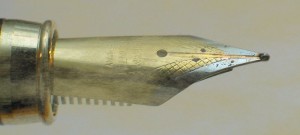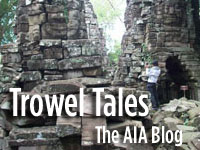The Taliban, Google, and More Mail
by Heather Pringle
April 10, 2009
 Each morning, almost without fail when I am at home, I sit down at my computer with a shiny red thermos of coffee, and click on the comments that you have posted over the previous 24 hours. It’s often just getting light outside, the street is quiet, and my faithful companion, Max the lab, is snoring peacefully in my office. In that grey time, my favorite part of the work day, I read your eloquent, amusing, enlightening,  and occasionally infuriating comments.Â
Each morning, almost without fail when I am at home, I sit down at my computer with a shiny red thermos of coffee, and click on the comments that you have posted over the previous 24 hours. It’s often just getting light outside, the street is quiet, and my faithful companion, Max the lab, is snoring peacefully in my office. In that grey time, my favorite part of the work day, I read your eloquent, amusing, enlightening,  and occasionally infuriating comments.Â
No writer could ask for a better or more thoughtful readership, and I want to apologize here for not always returning the favor and posting replies.  In my own defense, I’ll only say that your comments sometimes arrive just as I am struggling mightily to meet a tough deadline or am away in the field. But I want to assure you that I read everything that you leave for me and your fellow readers, and I’d like to thank you heartily for sharing your opinions, passions, and knowledge.Â
But let me try to make amends by replying to some recent comments. I’ve noticed that readers are particularly inspired to write when archaeology intersects with popular culture, and my blog on “Is Google Making Archaeologists Smarter?†generated a lot of comments and personal emails. Livius wondered, for example, whether Nicholas Carr, the author of the original Atlantic Monthly article, “Is Google Making Us Stupid,† “has considered the immense educational value of a flattened knowledge hierarchy. Until recently, amateurs and aficionados without access to scholarly journals and extensive academic libraries have had to struggle to follow a train of inquiry.â€
I agree whole-heartedly with Livius that the internet places an immense amount of scientific and archaeological information at our fingertips, and that this levels in part the playing field for non-academics keen to follow or contribute to the field of archaeology. But there is a flip side to this. By democratizing archaeological data—particularly in the form of digital atlases—researchers are potentially handing looters new tools for locating sites with lucrative antiquities. Clearly archaeologists need to weigh benefits against the potential dangers before posting details on line.   Â
In reference to “What Will Happen to Ancient Art in the Taliban’s Swat,†Rupa Abdi notes that “It is difficult to believe that the Taliban brand of Islam can dehumanize a person to such an extent—making him insensitive to even the sublimest of art form….â€Â I share Ms. Abdi’s dismay at this situation but I believe that the Taliban’s particular interpretation of Islam is only one part of the problem. Taliban supporters are totalitarians and there is a long history of such governments trying to control and rewrite the ancient past, often obliterating inconvenient facts and truths. One need look no further than Nazi Germany, where SS leader Heinrich Himmler founded a major research institute, the Ahnenerbe, to manufacture evidence showing that an ancient mythical master race of blonde-haired, blue-eyed warriors had coined civilization. Proof to the contrary was buried or ignored.  I think the Taliban would much prefer that we all forget the Buddhist past in Swat.
Please keep posting your comments. And if you don’t have anything better to do next Thursday night, April 16th, and find yourself in Vancouver, please join me at the Vancouver Public Library downtown.  I’ll be giving a public reading.Â
Â
Â
Comments posted here do not represent the views or policies of the Archaeological Institute of America.






 Heather Pringle is a freelance science journalist who has been writing about archaeology for more than 20 years. She is the author of Master Plan: Himmler's Scholars and the Holocaust and The Mummy Congress: Science, Obsession, and the Everlasting Dead. For more about Heather, see our
Heather Pringle is a freelance science journalist who has been writing about archaeology for more than 20 years. She is the author of Master Plan: Himmler's Scholars and the Holocaust and The Mummy Congress: Science, Obsession, and the Everlasting Dead. For more about Heather, see our 



